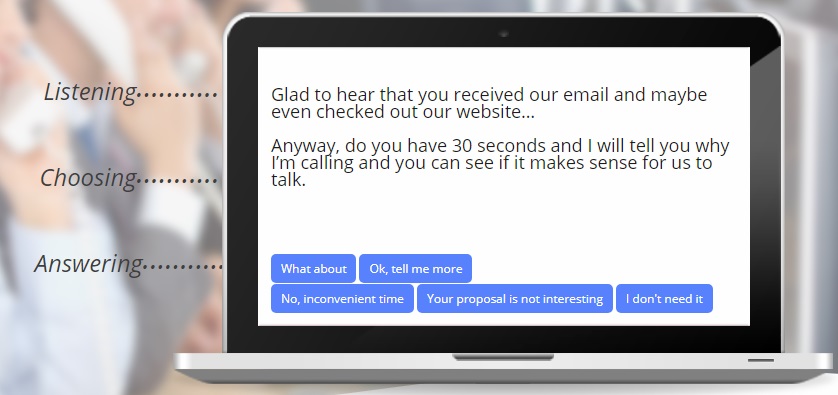An error, “a lapse” - is something that can be corrected. A blunder - is a critical error, that is almost impossible to correct. These kinds of “blunders” decrease a conversion rate, reduce profits, and have a negative influence on your reputation.
In this article, you will learn how to detect the errors and “blunders” at the early stages and correct them quickly. More importantly, you can do it without having to complete expensive sales trainings and without total listening to the recordings of your customer relationship managers’ phone conversations.
It does not matter at all whether you know all these errors or just some of them. The real problem consists in the detection of your errors and their elimination.
We have all heard or know that after the customer’s answer “no!”, - the sale just begins. What practical use does this knowledge have? We acknowledge, objections exist, but what is next?
One should learn to not only identify objections but also process them correctly, and one should not get scared and hang up after the second “we don’t need this” statement.
By the way, even the majority of experienced sellers end phone negotiations after the third objection of the customer. Perfect and sinless “without blunders” seller is able not only to overcome resistance but also not to attract critical objections, and also continue to lead a relaxed conversation even in cases of very tough objections.
Even though such nice sellers are possible to meet, they cost a lot of money, and, as a rule, sooner or later disappear anyway. At the labor market, there are almost none of them; they find a job very quickly.
Even if you have enough resources, money, and time, to spend months looking for a needle in a haystack, there is no guarantee that you can basically recruit ready star sellers into your sales department at any reasonable time.
That is why, it is more reasonable to spend your time and energy on the creation of methods of achieving results with average sellers but not with star ones. In many projects, average sellers with the well set system work bring more sales and income than star sellers.
The main question: how can we find out whether the critical errors in the phone conversations (“blunders”) were made or not?
Additional question: was the sales manager good at defending the deal or not?
The answers to these questions differ a little bit when working at the B2C and B2B markets.
During the phone negotiations with individuals, one is rude and hangs up more often. And if you work precisely with private buyers, the most important factor of success is specific speech wording or scripts. Scripts in most cases work better than improvisations.
For example, you can ask: “I am calling regarding...Can you talk right now?” or “ Will you find 3 minutes to discuss…”. According to statistics, in the second case, the rate at which the clients start the conversation is higher than in the first one.
Let’s assume, we received an answer “No, I can’t/ not now ” to both of the questions. You can ask: “ When will you be able to?”, and risk getting an answer: “Never”. Or you can answer differently: “If you can’t right now, let me call you at a more convenient time. What about tomorrow at 4:00 pm?”.
That is why newbies with good scripts, especially at simple calls, always defeat the experienced stars in terms of effectiveness while the stars improvise trying to diversify their work and allow the “blunders” to happen.
To avoid these kinds of “blunders”, it is better to list the best speech modules for the main stages of phone negotiations as soon as possible:
- Passing through the secretary/ blocker (for B2B)
- Stepping into conversation
- Overcoming of resistance (download and print the cheat sheet)
- Mini-presentation of the benefits of the offer
- Work with objections
- Upsell (start of the extension of the deal)
- Suggestion of the next step
- Summary, arrangements, and end of the conversation
As you can see, there are many application points of verified phrases and speech modules. Even experienced managers are not able to remember and apply “the best” speech templates without electronic hint.
On the paper, scripts and hints do not work - there are too many of them. One cannot fit them in one A4 sheet, for sure, and in several sheets, it is hard and uncomfortable to orient.
You can significantly simplify the training of newbies and the work of experienced managers if you create the electronic script suggesting you the exact phrases and formulations. For example, in the Sales Script Prompter with context buttons at the bottom and universal “hint” answers to the right:

In this way, both in B2B and B2C, one can solve the issue of critical blunders avoidance by using the best speech modules which do not allow the customer to hang up and you to attract the critical objection.
During the phone negotiations in B2B sales, scripts are also important, but the main critical mistake of sales managers lies elsewhere.
The main “blunder” in B2B sales is managers’ inability to work with resistance and rejections. At first, in the stage of passing through the secretary, then in the stage of establishing a contact, and finally, at the time of closing a deal or during the arrangements.
Yes, surprisingly enough, all the sales negotiations in B2B end not when the customer says: “we don’t need this”, - but when the manager gives up and makes an independent decision about the refusal to continue the conversation.
Company representatives hang up very rarely. Business etiquette and corporate rules do not allow this.
Nevertheless, more than 90% of failed conversations of sales managers in B2B end after the third refusal of the customer while successful sales managers continue to further lead the conversation and negotiate about the next step.
2 questions emerge:
- How to teach managers to “take a punch”?
- How to find out how well in each specific case a sales manager “took” or “did not take punches”?
The first question, «how to teach managers “to take a punch”», deserves separate attention. Subscribe to the newsletter “Active sales over the phone” and follow our news. In the nearest time, we will try to issue a separate article on this topic.
There can be several solutions to the second question:
- Trust the records in the CRM system (rely on manager’s independent esteem)
- Listen to the recordings of phone conversations
- Automatically without listening with the help of the Script Prompter service
A joke:
“A man went on a steamboat cruise across the Atlantic. He returned with a suitcase full of money. A wife is like:
- Where did you get it?!
- I was in England and visited a casino. I saw men sit and play poker. I joined them, we played a bit, and at this moment, one man said: “ I have a point”. I told him: “Show!”, and he answered: ”We are all gentlemen here, we believe each other on our bare words..”. And after that I got lucky with a good card!..”
Option A: as you have already understood, trusting the recordings in the CRM system is unreasonable. Besides, I have never seen the sales managers count the number of objections during the conversation and enter this data in the CRM system. Fantasy!
Option B: Even at selective listening, it will cost you around 15-20% of the payroll of the whole sales department. I personally know several companies, that have 1-3 call quality specialists that listen to the recordings of sales managers’ conversations per 10-15 people.
Is it not better to direct skills and energy of highly qualified specialists (“listeners”) at the acquisition of new sales? It is better they talk to clients and earn money for themselves and the company.
Option C: automatically, even without selective listening, only in a few minutes.
Sounds unreal, looks like fantasy. Nevertheless, with the help of “Script Prompter” service, it is possible.
Register in the Sales Script Prompter and wait for the issue of the new article “The technique of bottlenecks detection and correction at implementation of sales scripts”.
Summary:
- Good speech templates work better than improvisation
- Even experienced managers need cheat sheets
- Detection and correction of blunders can be done automatically without tedious listening
- Sales without blunders are possible.
Additional materials:
- An article “19 mistakes killing the effectiveness of the cold call script”
- A cheat sheet “ For the work with resistance and excuses”
- A video “8 mistakes of incoming calls processing”


